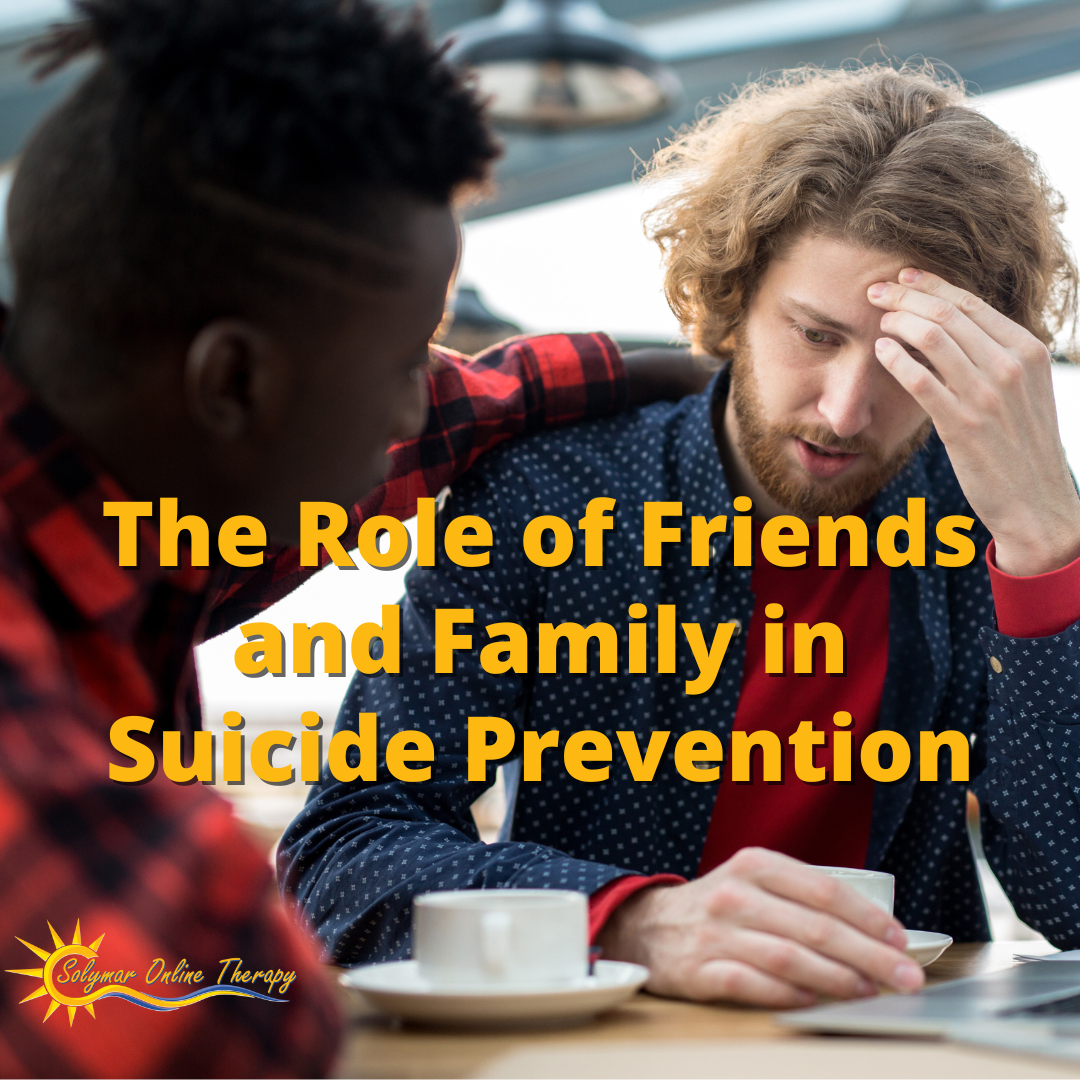 Introduction
Introduction
Suicide is a complex and devastating issue that affects individuals and communities worldwide. In the fight against suicide, friends and family members play a crucial role as frontline advocates and support systems. Their understanding, compassion, and intervention can make a significant difference in preventing suicide. In this article, we will discuss the vital role of friends and family in suicide prevention, offering guidance on how to approach conversations about mental health and suicide, and how to support loved ones in seeking professional help.
Understanding the Impact of Friends and Family
Friends and family members often have the most significant influence on an individual's life. They provide a strong support system that can positively impact their emotional well-being. In times of distress, having someone who cares and listens without judgment can be a lifeline for someone struggling with suicidal thoughts.
The presence of a supportive and understanding network can reduce feelings of isolation and hopelessness, which are common risk factors for suicide. Friends and family members who recognize the signs of distress and intervene appropriately can serve as critical protective factors, preventing the escalation of suicidal thoughts into actions.
Approaching Conversations about Mental Health and Suicide
Talking about mental health and suicide can be difficult and uncomfortable, but open conversations are essential in creating a supportive environment. Here are some tips on approaching these sensitive discussions:
-
Choose the Right Setting: Find a private and safe space where the person feels comfortable and at ease.
-
Be Empathetic and Non-Judgmental: Approach the conversation with empathy and understanding. Listen actively without jumping to conclusions or passing judgment.
-
Use Open-Ended Questions: Ask open-ended questions to encourage the person to express their feelings and concerns more openly.
-
Express Concern and Support: Let the person know that you are genuinely concerned about their well-being and that you are there to offer support.
-
Educate Yourself: Be informed about the warning signs of suicide and mental health issues to recognize when someone might be struggling.
-
Avoid Minimizing Their Feelings: Never trivialize the person's emotions or tell them to "snap out of it." Show genuine concern and validation for their experiences.
-
Focus on Listening: Allow the person to talk and share their thoughts and feelings without interruption. Sometimes, they might just need someone to listen.
Supporting Loved Ones in Seeking Professional Help
While friends and family can provide essential emotional support, professional help is often necessary in addressing mental health concerns and suicidal thoughts. Here's how you can support your loved ones in seeking professional help:
-
Normalize Seeking Help: Encourage the idea that seeking help from mental health professionals is a positive step toward healing and growth.
-
Offer Assistance: Offer to help your loved ones find mental health resources, such as therapists or counseling services.
-
Accompany Them: If they are hesitant about seeking help, offer to accompany them to their first appointment to provide emotional support.
-
Follow Up: Check in on their progress and remind them that you are there to support them through the process.
-
Be Patient: Recovery takes time, and setbacks are a normal part of the journey. Be patient and continue offering your support.
Recognizing and Responding to Warning Signs
It's essential to be aware of warning signs that someone may be struggling with suicidal thoughts. These signs may include:
-
Expressing a Desire to Die or End Their Life: Statements like "I wish I wasn't here" or "I can't take it anymore" should never be ignored.
-
Withdrawal and Isolation: Social withdrawal and isolation from friends and family can indicate emotional distress.
-
Giving Away Possessions: The person may start giving away their belongings as if they won't need them anymore.
-
Sudden Changes in Behavior: Drastic changes in behavior, mood swings, or engaging in risky behaviors could be warning signs.
-
Expressions of Hopelessness and Despair: Feelings of hopelessness and a lack of purpose can indicate significant emotional turmoil.
-
Putting Affairs in Order: Making arrangements as if preparing for the end, such as finalizing wills or saying goodbye to loved ones.
If you notice any of these warning signs in a friend or family member, take them seriously and intervene promptly.
Conclusion
Friends and family members play a critical role in suicide prevention by providing a supportive and understanding network for individuals in distress. Open conversations about mental health and suicide are essential in breaking down stigma and creating a safe space for those struggling to seek help. By recognizing warning signs, offering empathy and support, and encouraging professional help when needed, friends and family members can serve as lifelines for those in crisis. Together, we can work towards a society where everyone feels supported, valued, and heard, reducing the risk of suicide and promoting mental well-being.
Hashtags: #SuicidePrevention #SupportNetwork #MentalHealthAwareness #FriendsAndFamily #OpenConversations #BreakingTheStigma #MentalWellbeing #ProtectiveFactors #ProfessionalHelp #EmotionalSupport
Suicide Help
Suicide Help Lines
![UK Suicide Help Lines]() UK
UK
Here are some UK-based helpline numbers and resources that individuals can reach out to for immediate support if needed:
-
Samaritans Helpline: 116 123 Website: www.samaritans.org
-
Mind Infoline Helpline: 0300 123 3393 Text: 86463 Website: www.mind.org.uk
-
CALM (Campaign Against Living Miserably) Helpline: 0800 58 58 58 Website: www.thecalmzone.net
-
PAPYRUS (Prevention of Young Suicide) Helpline (for under 35): 0800 068 41 41 Website: www.papyrus-uk.org
-
The Mix (for under 25) Helpline: 0808 808 4994 Website: www.themix.org.uk
-
Rethink Mental Illness Helpline: 0808 801 0707 Website: www.rethink.org
-
YoungMinds (for parents concerned about their child's mental health) Helpline: 0808 802 5544 Website: www.youngminds.org.uk
-
Childline Helpline: 0800 1111 Website: www.childline.org.uk
Remember, if you or someone you know is in immediate danger or requires urgent medical attention, please call 999 or go to the nearest hospital emergency department.
These helplines and resources are staffed by trained professionals who can provide confidential support, guidance, and a listening ear to those experiencing emotional distress, including thoughts of suicide. It's crucial to reach out for help when needed, and these organizations are there to offer support 24/7.
![Canada Suicide Help Lines]() CANADA
CANADA
Here are some Canadian-based helpline numbers and resources that individuals can reach out to for immediate support if needed:
-
Canada Suicide Prevention Service Helpline: 1-833-456-4566 Website: www.crisisservicescanada.ca
-
Crisis Text Line Canada Text: CONNECT to 686868
-
Kids Help Phone (for youth under 20) Helpline: 1-800-668-6868 Website: www.kidshelpphone.ca
-
First Nations and Inuit Hope for Wellness Help Line Helpline: 1-855-242-3310
-
Trans Lifeline Helpline: 1-877-330-6366 Website: www.translifeline.org
-
Canadian Mental Health Association (CMHA) Crisis Line Check your local CMHA branch for the helpline number.
-
Crisis Services Canada Helpline: 1-833-456-4566 Text: 45645
-
Distress Centres of Greater Toronto Helpline: 416-408-4357 Text: 45645
These helplines and resources provide confidential support and assistance to individuals in Canada who may be experiencing emotional distress, suicidal thoughts, or other mental health challenges. Trained professionals are available to offer help 24/7, ensuring that those in need have access to immediate support and someone to talk to during difficult times.
As with any crisis situation, if you or someone you know is in immediate danger or requires urgent medical attention, please call 911 or go to the nearest hospital emergency department.
![US Suicide Help Lines]() USA
USA
Here are some USA-based helpline numbers and resources that individuals can reach out to for immediate support if needed:
-
National Suicide Prevention Lifeline Helpline: 1-800-273-TALK (1-800-273-8255) Website: www.suicidepreventionlifeline.org
-
Crisis Text Line Text: HOME to 741741 Website: www.crisistextline.org
-
Veterans Crisis Line Helpline: 1-800-273-TALK (1-800-273-8255), press 1 Text: 838255 Website: www.veteranscrisisline.net
-
SAMHSA (Substance Abuse and Mental Health Services Administration) National Helpline Helpline: 1-800-662-HELP (1-800-662-4357) Website: www.samhsa.gov/find-help/national-helpline
-
National Alliance on Mental Illness (NAMI) Helpline Helpline: 1-800-950-NAMI (1-800-950-6264) Website: www.nami.org
-
TrevorLifeline (for LGBTQ+ youth) Helpline: 1-866-488-7386 Website: www.thetrevorproject.org
-
RAINN (Rape, Abuse & Incest National Network) National Sexual Assault Hotline Helpline: 1-800-656-HOPE (1-800-656-4673) Website: www.rainn.org
-
National Domestic Violence Hotline Helpline: 1-800-799-SAFE (1-800-799-7233) Website: www.thehotline.org
These helplines and resources offer confidential support and help to individuals in the USA who may be experiencing emotional distress, suicidal thoughts, or dealing with mental health and related issues. Trained professionals are available 24/7 to provide immediate assistance and a listening ear for those in need.
In case of a life-threatening emergency or immediate danger, please call 911 or go to the nearest hospital emergency room for immediate help.

 UK
UK CANADA
CANADA USA
USA




